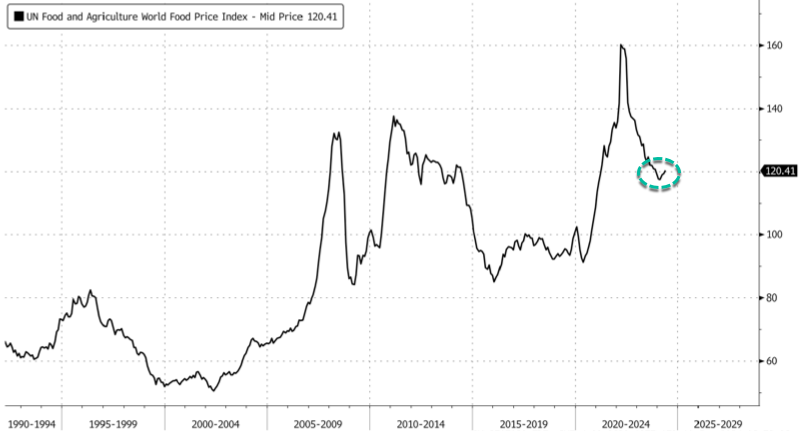- Watch The JD Rucker Show every day to be truly informed.
(Zero Hedge)—Sunny Verghese, CEO of Olam Agri, a Singapore-based agricultural trading firm, spoke at the Redburn Atlantic and Rothschild consumer conference last week, warned the audience that the world is heading towards a period of “food wars” as geopolitical wildfires spread across the globe.
“We have fought many wars over oil. We will fight bigger wars over food and water,” Verghese said, quoted by the Financial Times, adding that food protectionism has forced some governments to boost domestic food supplies, exacerbating food inflation.
He pointed out that a surge in non-tariff trade barriers in 2022 in response to the war in Ukraine—1,266 from 154 countries by his count—had sparked “an exaggerated demand-supply imbalance.”
Food prices have soared in recent years, whether due to adverse weather conditions (sparked by El Nino) or the war in Ukraine. These prices are likely to remain elevated for years to come.
Verghese said wealthier countries have been building surpluses of strategic commodities due to global uncertainty, which has helped push food prices higher.
“India, China, everybody has got buffer stocks,” he said, adding, “That is only exacerbating the global problem.”
The latest data from the Food and Agriculture Organization of the United Nations shows that global food prices are beginning to rise once again and remain well above pre-Covid levels.
What’s clear is that the most impoverished countries are extremely vulnerable to surging food prices and shortages, and these areas are at the highest risk of social unrest.
However, wealthier economies aren’t immune, as we’ve seen evidence with US consumers pulling back on food spending while complaining about the failure of Bidenomics.
FT provided two recent examples of food protectionism that is likely to continue in the years ahead, exacerbating food security risks for the world’s most vulnerable:
In 2022, Indonesia banned palm oil exports to protect the local market while last year India imposed export restrictions on certain types of rice in an effort to curb rising domestic prices ahead of parliamentary elections, after a volatile monsoon disrupted production and spurred fears of a supply shortage.
The risks are skewed toward more food export curbs as the world splinters into a multipolar state full of conflict and chaos. Protectionism might be the worst thing for food security and yet another reason why prices will linger at elevated levels for the years to come.
This is yet more evidence that Americans need to ditch Walmart and the food-industrial complex and support local farmers so they can beef up local supply chains to minimize risks abroad.
Controlling Protein Is One of the Globalists’ Primary Goals
Between the globalists, corporate interests, and our own government, the food supply is being targeted from multiple angles. It isn’t just silly regulations and misguided subsidies driving natural foods away. Bird flu, sabotaged food processing plants, mysterious deaths of entire cattle herds, arson attacks, and an incessant push to make climate change the primary consideration for all things are combining for a perfect storm to exacerbate the ongoing food crisis.
The primary target is protein. Specifically, they’re going after beef as the environmental boogeyman. They want us eating vegetable-based proteins, lab-grown meat, or even bugs instead of anything that walked the pastures of America. This is why we launched a long-term storage prepper beef company that provides high-quality food that’s shelf-stable for up to 25-years.
At Prepper All-Naturals, we believe Americans should be eating real food today and into the future regardless of what the powers-that-be demand of us. We will never use lab-grown beef. We will never allow our cattle to be injected with mRNA vaccines. We will never bow to the draconian diktats of the climate change cult.
Visit Prepper All-Naturals and use promo code “veterans25” to get 25% off plus free shipping on Ribeye, NY Strip, Tenderloin, and other high-quality cuts of beef. It’s cooked sous vide, then freeze dried and packaged with no other ingredients, just beef. Stock up for the long haul today.







Obviously.